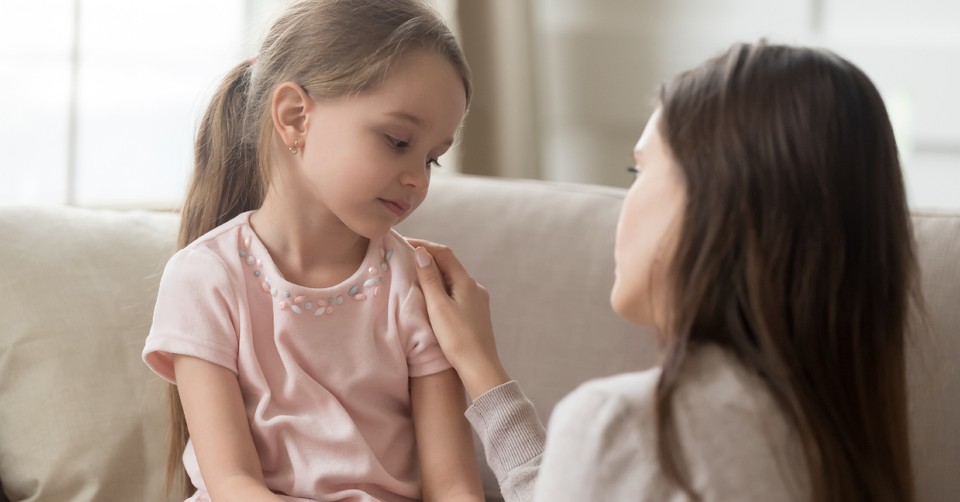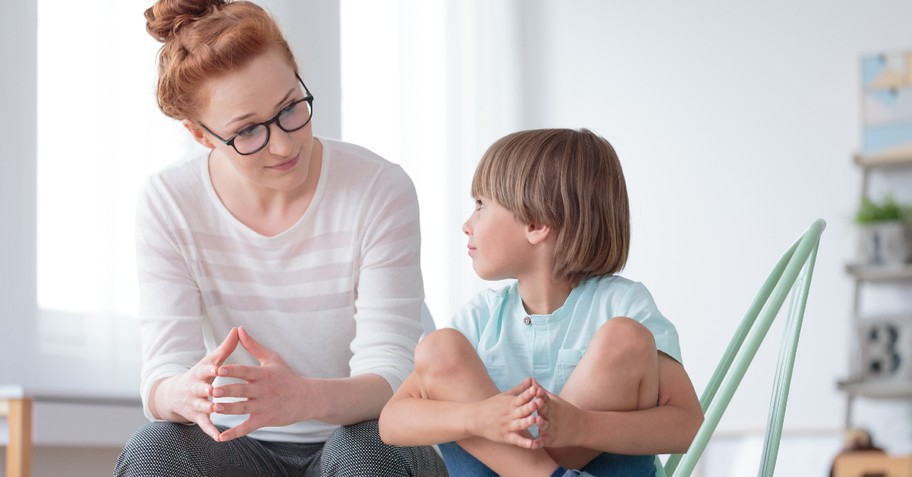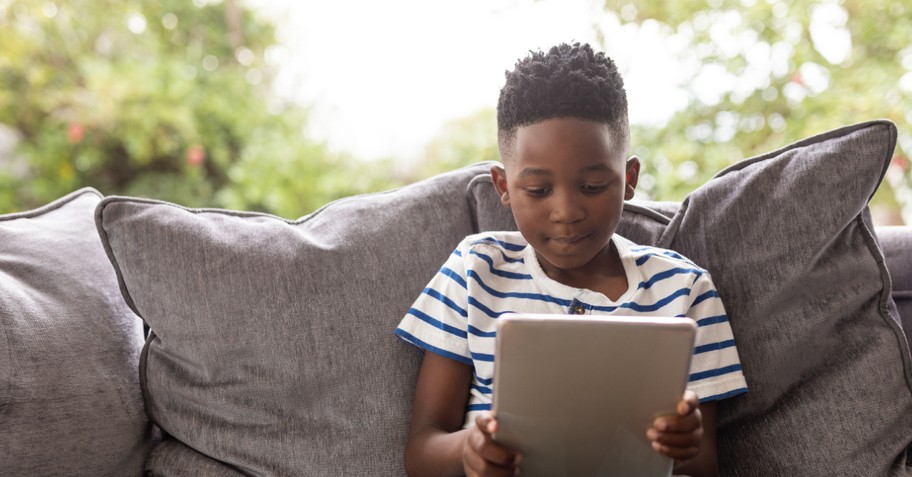How to Talk to Your Kids about the Tragedies of COVID-19

When our world was first affected by COVID-19, it was pretty easy to keep the details vague about why our activities were suddenly canceled when talking to our kids. As time has gone on we've had no choice but to more fully explain some of the scary truths our world is currently facing.
No parent wants to cause unnecessary fear and paranoia in our children but as more time passes without playdates, school, and church; some tough conversations are required.
How do we prepare our children for this “new normal” and help equip them with the tools and information they need to stay safe while shielding their hearts from unnecessary pain and fear
It’s a delicate balance to strike! Especially when adults are still confused on how to handle this new threat that has swept across the globe like wildfire
Here are 5 ideas on how to talk to your kids about some of the harder effects of COVID-19 on our world.
Photo Credit: © GettyImages/fizkes

1. Keep the Information You Share Age-Appropriate
One of my favorite quotes that has guided how I approach sharing difficult truths with my kids comes from Corrie Ten Boom’s The Hiding Place. It says,” “Some knowledge is too heavy...you cannot bear it...your Father will carry it until you are able.”
Some of the truths around the Coronavirus are too heavy for our young kids to shoulder. We want to preserve their sense of wonder and their ability to trust in the world around them for as long as we can.
It’s appropriate to give them instructions on what being safe looks like now without it being necessary to answer every question about why they suddenly need to keep their distance from friends and family.
My children are ages 8, 6 and 3. My 6 and 3-year-old don’t really have the capacity to understand that the world is in crisis. They are content to play at home and are satisfied with the general explanation that we can’t go out as often because a new sickness is going around.
Our 8-year-old, though, is very inquisitive and seems to understand that a major shift has happened in our day-to-day lives. We need to talk more to him about the threat we are now living with and he really wants to know what we know about this virus.
He very intuitively commented that what we are living through now will be a part of what is written in the history books.
The reality is that each child is different. You could have a very mature 5 year old that wants to understand the ways our world is currently suffering. You are the one that best knows what your child can handle.
Use your discretion as to what information each of your children are mature enough to handle. Avoid placing undue stress and anxiety on their shoulders.
It’s entirely okay to let them know that some things they aren’t old enough to know yet but you are there to take care of them. Assure them that they can rest easy in that knowledge that you are there for them.
Photo Credit: ©Unsplash/Liana Mikah

2. Be Honest, yet Optimistic
When our kids approach us wanting to know how sick people are getting from this virus, it’s okay to be honest about what we know and about what we don’t know.
The truth is a part of why so much precaution is being taken in our world is because even the brightest minds in our world are struggling to understand this new virus.
It’s okay to admit to our kids that since this is a new threat, we don’t know a lot about how badly it can affect people and also are still finding ways to treat people if they do get sick.
Let them know we have to be extra careful around those in our lives that may be sick already or older in age because they seem to get the most sick and some even die. It’s helpful for them to know how to protect the people around them through their actions.
We should keep a hopeful and optimistic tone for our kids! Don’t just share the bad or hard news with them. Tell them all the ways people are working to help the sick in our communities.
Explain that doctors have found ways to treat other illnesses over the years and that they are all working hard to do that again.
They need to feel that there is hope even in this dark time. Explaining these things to them may also be a boost to your own morale as we all need to find more ways to focus on the positive as we walk through this difficult season.
Photo Credit: Unsplash/Sai de Silva

3. Invite Them to Pray for Our World
Now is a great time to model our faith to our kids in a meaningful and relevant way. This is one crisis that affects them just as much as you!
They are stuck home, away from their friends, and missing their lives just as much as you. Invite them to bring their worries, cares, and fears to Jesus.
Here some ideas on how to incorporate family prayer time into your routine:
-Make a “prayer jar” and write the names of people you know are in need to pray for during this time
- Make a “prayer chain” with construction paper and tear off links when you see a prayer is answered
- Spend more time praying for others at family mealtimes and/or at bedtime
- Create a family Prayer Wall
Press pause daily as a family to pray together for those suffering in our world. Don’t forget to pray for things your family is facing too.
God is still good and still with us even in a dark and uncertain season. Remind your kids of these truths as much as possible.
In addition to praying, choosing some memory verse to meditate on together could help ease the anxiety that we are all grappling with. You could turn memorizing scripture into a game or friendly competition, if you feel like that could help your kids connect and have fun.
Your faith and Jesus’ presence here on earth with us should be a central part of all our coronavirus-related conversation.
Photo Credit: ©Unsplash/Ben White

4. Listen to Their Concerns
Each of us process hard things differently but one thing is true for us all: we all need to feel heard and loved. I never cease to be amazed by the things that come out of the mouths of my children!
They ponder and worry about things that I would have never considered. The only way to really know what might be keeping your kids up at night through this season is to simply ask.
They may be worried about friends, grandparents, missing out on a big event, you losing your job, getting sick themselves, what the future is going to look like, or all of the above. As parents, we don’t have to have all the answers for our kids but our kids do need to feel like they have a safe space to express their concerns.
Our kids need to feel secure through this season of upheaval and security comes when we live our lives in the context of trustworthy relationships. If you are struggling to provide financially for your kids or struggling to provide for your family in any other way, what they need to weather the hard times well is you.
If you haven’t already, take a moment and start a conversation with your kids about what is happening in our world right now.
Ask them what they are most concerned about, what they are most confused about, and what is on their minds right now. Hear them out and then answer them honestly with age-appropriate language.
Photo Credit: ©GettyImages/KatarzynaBialasiewicz

5. Monitor Their Media Consumption
This mostly applies to older kids that have access to the internet. As an adult reading the news online is overwhelming, confusing, and the facts are hard to find—let alone this burden for a child.
We need to make sure we are taking the lead on helping our kids process the news. We need to determine which sources are comfortable with them getting information from and also need to limit the amount of time they spend consuming news media.
If we don’t keep tabs on what information they are consuming from the internet, it’s very possible they could be overwhelmed by the tragedy that fills the headlines. Even the commercials on Hulu come with scenes of empty parking lots or packed hospitals.
Make sure you open up a conversation about what images they have come across while watching TV, on social media, or browsing the internet.
Determine what limits feel appropriate for your kids, keep checking in with them about what they are seeing online, and talk about the headlines they are seeing together.
As you navigate these tricky conversations a life giving verse that can help guide you is Philippians 4:7. It says, “And the peace of God, which surpasses all understanding, will guard your hearts and your minds in Christ Jesus.”
Speak these words to your children, reminding them that in Christ we have access to supernatural peace, no matter our circumstances.
Even beyond that, we have the ability to ask God to give peace to those that are suffering! Invite them to turn their worries into prayers and use discretion on how much you share with them. We can carry the heavier pieces of information that come with this Pandemic for our kids until they are old enough to have the capacity to process something as difficult as this is for us all.
Amanda Idleman is a writer whose passion is to encourage others to live joyfully. She writes devotions for the Daily Bible Devotions App, she has work published with Her View from Home, also for the MOPS Blog, and is a regular contributor for Crosswalk.com. You can find out more about Amanda on her blog or follow her on Instagram.
Photo Credit: ©GettyImages/Wavebreakmedia
Originally published April 29, 2020.









